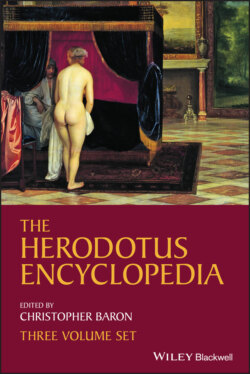Читать книгу The Herodotus Encyclopedia - Группа авторов - Страница 277
ALEXANDER I (Ἀλέξανδρος, ὁ) son of Amyntas
ОглавлениеIOANNIS XYDOPOULOS
Aristotle University of Thessaloniki
Son of Amyntas, king of MACEDONIA (c. 497/6–454 BCE). Alexander is the only Macedonian king to play a role in Herodotus’ narrative of the PERSIAN WARS, but he makes an impressive entry earlier (5.17–21). There, Herodotus describes how Alexander deceived and killed the seven Persian envoys who had demanded and received EARTH AND WATER (i.e., formal submission to the Great King of PERSIA) from his father Amyntas, probably in 513/12. As king of Macedonia, Alexander appears on five other occasions in the Histories, four of them connected with Herodotus’ narrative of 480–479. i) At TEMPE (7.173.3) he tried to warn the Greek forces that resistance to the vast Persian army would be useless. ii) He saved the Boeotian CITIES from destruction, by placing garrisons and persuading XERXES that the BOEOTIANS were loyal to Persia (8.34). iii) He appears in ATHENS (8.136.1–3, 140.α.1–β.4) as an envoy of MARDONIUS, since he was already a PROXENOS and euergetēs (benefactor) of the Athenians, to try to convince them to become ALLIES of Persia. iv) He reveals Persian plans about the forthcoming attack at PLATAEA to the Athenian generals on the eve of the battle (9.44–45). Finally, as a coda to his initial appearance (5.22), Herodotus also describes how Alexander advanced his Greek descent from the Argive Temenids as an argument for his competing in the Olympic Games; the final verdict of the HELLENODIKAI was in Alexander’s favor.
Thus Herodotus presents Alexander as a philhellene (friend of the Greeks) and at the same time of Hellenic descent. The story of the MURDER of the Persian envoys, which casts Alexander as an enemy of the Persians from a young age, is a later invention; otherwise, it is hard to explain the Persians’ subsequent treatment of Alexander, such as Mardonius choosing him as an envoy to Athens, or other sources’ claim that Xerxes rewarded Alexander generously by allowing him to rule the region between Mt. OLYMPUS and Mt. HAEMUS (Just. Epit. 7.4.1). Alexander’s participation in the games at OLYMPIA has also been questioned, and the lineage he presents (going back to HERACLES) must be an attempt by the Macedonian royals to bind their land with the rest of the Greek world. Some scholars have seen in these two incidents, as well as the speech at Plataea, Herodotus uncritically accepting these (deliberately false) stories he heard on a visit to Macedonia. But in that case, how can one explain Alexander’s impressive DEDICATION of a golden statue at DELPHI, right next to the TRIPOD dedicated by the other Hellenes (8.121.2), in the first flush of victory against the Persians? This action of Alexander, which was cited until the age of Demosthenes (8.24), is of particular significance when we remember that victory against the Persians had reinforced the polarization between Greeks and BARBARIANS.
SEE ALSO: Advisers; Amyntas son of Alcetas; Hellas; Medize; Sources for Herodotus; Speeches; Temenus, Temenids
